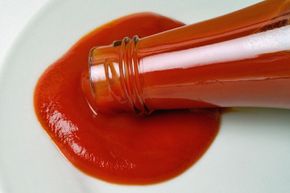Although a tall bottle filled with thick, sweet, red liquid may be your definition of ketchup, in other parts of the world, ketchup may be very different from the reliable tomato-based favorite you're used to.
Ketchup -- A History
Advertisement
Ketchup has undergone a number of makeovers across the centuries. It probably started life in Asia as a briny fish sauce and migrated to Europe via the trade routes in the 1600s. There are also many names attributed to ketchup, probably cultural adaptations of the Chinese words ke-tsiap or koe-chiap that can make understanding the history of this king of condiments more challenging. We do know that early ketchups were more tart than sweet and sported ingredients like soy, fish juices, nuts and mushrooms. As each culture adopted a ketchup-like sauce, it added its own local ingredients and probably changed the name a little [source: Mitchell].
What is ketchup?
With all those possible ingredients, what distinguishes ketchup as a unique sauce? Well, part of it may be the way it's used. Ketchup is typically a condiment rather than an ingredient in food. It's most often added to a prepared dish rather than included in the creation of the dish itself. Ketchup also usually has a vinegar base that makes it resistant to bacterial growth. As a result, it stores well at room temperature.
Ketchup Meets the Tomato
Immigrants brought ketchup with them to North America, and in the late 1700s, New England fisherman introduced a new element, the fruit from a plant they brought back from their travels south: the tomato. Once ketchup turned red, there were lots of variations on the tart, flavorful sauce that included this new ingredient. In 1876, Heinz added a sweet, tomato-based ketchup to its popular condiment line, and a classic was born [source: Kerrigan].
International Ketchup
In other countries, the ketchup story goes a little differently. Good old American ketchup is sweet, but tart varieties have their international advocates. Ketchups that have something other than a tomato base, like Great Britain's mushroom ketchup, have a long history and devoted following, too. It's not too hard to find ketchups that have a fruit base, like grape or tamarind, or are made with peppers or nuts instead of tomatoes. Although they have a similar name to ketchup, they all have a unique taste and regional following.
Even among tomato-based ketchups, flavors can vary widely, usually due to the addition of different spices, like curry, or changes in the ingredient proportions. Some ketchups are sweet, and others are more vinegary and definitely not child-friendly.
You may ask if all of these pretenders are really ketchup. Some of them sound suspiciously like relish or chutney. Well, you can always take a walk on the wild side and try a few for yourself. This is an international excursion you can take during your lunch break; all you need is an adventurous spirit. The bus is departing from the international aisle of your market, and you don't even need to check the currency exchange rate.
Advertisement


